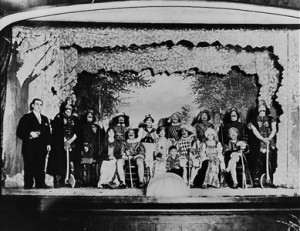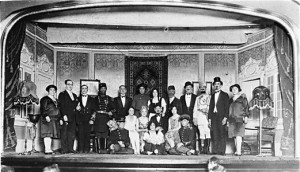As related in Family of Strangers: Building a Jewish Community in Washington State by Molly Cone, Howard Droker and Jacqueline Williams, theatre groups flourished in Seattle’s Jewish community early in the last century. “During the period 1910-1940 organizations such as the Menorah Society, a University of Washington social club, or the B’nai Brith – which staged Disraeli by Louise Parker in 1924 – would hire a hall and a dramatic coach and present a play complete with costumes and appropriate props.” At the Educational Center, known as the Settlement House prior to 1917, Jewish immigrants to Seattle were helped along in their “Americanization” process by using their English to perform in plays about Chanukah and Purim.
During the 1920s and 1930’s, the amateur Sephardic Drama Group performed plays entirely in the Ladino language. Leon Behar, an accomplished producer of Ladino theatrical productions, often served as the producer and director. The photos show productions held at Washington Hall, 14th Ave and E. Spruce Street in Seattle.
Popular Phenomenon
The tradition of amateur theater productions caught on in the Seattle Jewish community and dramatic groups proliferated. The roster of Jewish theater groups included the Temple Players at Temple De Hirsch Sinai which performed in the Temple Center, a large auditorium adjoining the Temple; the Sephardic Drama Group, which presented elaborately costumed performances at Washington Hall; the Jewish Dramatic Club; the Young Men’s Hebrew Association Players and the “Y” Players.
According to The Jewish Transcript (now The JT News), in July 1927 the Cornish School of the Theater presented the American premiere, in English, of The Devil’s Sabbath by S. Ansky, author of the classic The Dybbuk. In 1963 The Dybbuk was performed in operatic form at the Seattle Arts Center.
Changing Times
During and after the Second World War the popularity of dramatic productions faded and then disappeared within the Seattle Jewish community. According to Cone, Droker and Williams, “Instead of presenting plays, organizations sponsored carnivals, cabaret nights and elegant dinners.”
In the 1950’s one of the few groups offering the kind of theater that had once been common was the Center Stagers, based at the Seattle Jewish Community Center. Eventually they, too, passed from the scene. Jewish theater made a brief come-back for several years at the JCC in the 1980’s. Even without a local Jewish theater company, Jewish theater in Seattle has found an audience, as demonstrated by the Seattle Repertory Company’s considerable success with Wendy Wasserstein’s The Sisters Rosenzweig and Herb Gardner’s I’m Not Rappaport and the Intiman with The Diary of Anne Frank.

